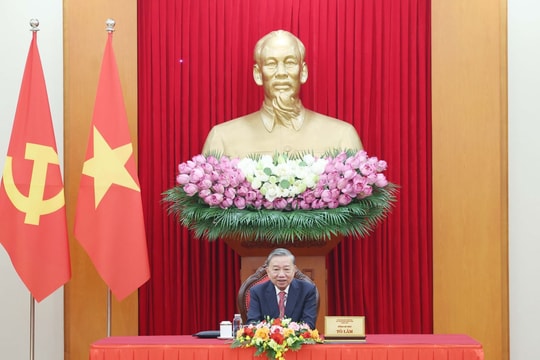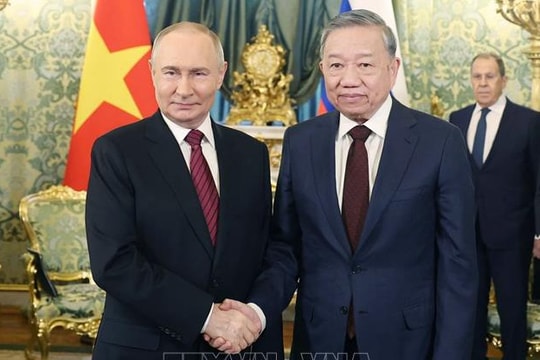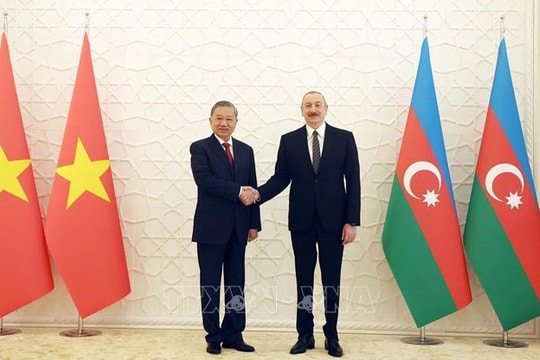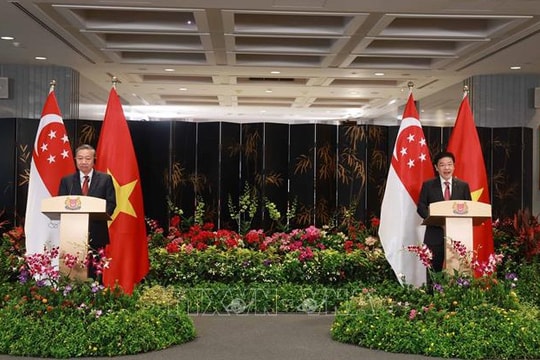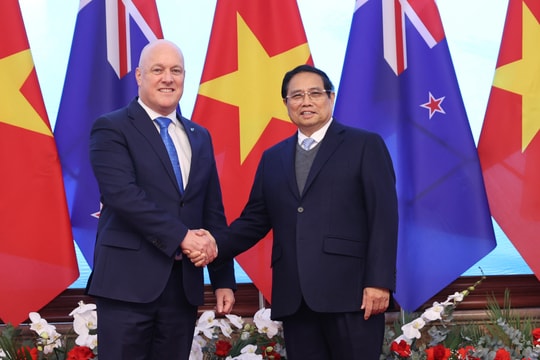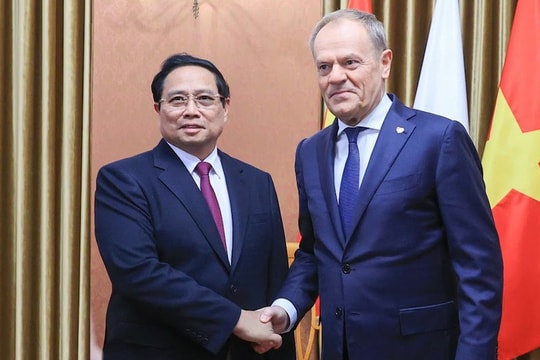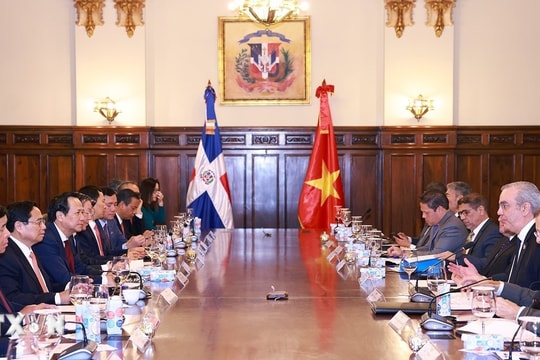Joint Statement of Vietnam - Russian Federation
The two heads of state wished to strongly develop the multifaceted cooperation between Vietnam and Russia based on the tradition of friendship and mutual respect.
At the invitation of Russian President Putin, President Tran Dai Quang paid an official visit to the Russian Federation from June 28 to July 1.
President Tran Dai Quang had a meeting and talks with Russian President Putin, met with Russian Prime Minister Medvedev, Chairman of the Federation Council of the Federal Assembly of the Russian Federation, and Chairman of the State Duma of the Federal Assembly of the Russian Federation.
The President of Vietnam laid wreaths at the Tomb of the Unknown Soldier, the Mausoleum of VI Lenin, the Statue of President Ho Chi Minh, delivered an opening speech at the Business Forum with the participation of businesses from both countries, met with Russian veterans and experts working in Vietnam and representatives of the Russia-Vietnam Friendship Association, and visited the city of Saint Petersburg.
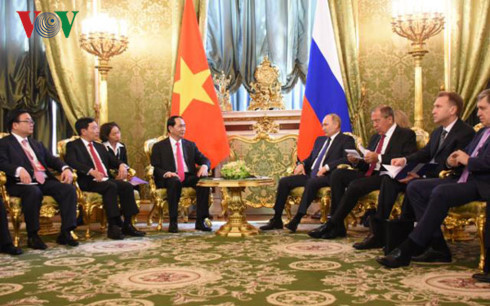 |
| The President and the Russian President at the meeting. |
President Tran Dai Quang and President Putin assessed the situation and prospects for further strengthening the comprehensive strategic partnership between Vietnam and Russia, proposed measures to enhance bilateral cooperation in priority areas, and discussed international and regional issues of mutual concern.
I. Vietnam - Russia Relations
1. The two heads of state shared the desire to strongly develop the multifaceted cooperation between Vietnam and Russia based on the long-standing tradition of friendship and mutual respect, emphasizing the importance of joint efforts to expand relations in the fields of trade - investment, science - technology and humanity. The two sides agreed to maintain regular and substantive political dialogue at all levels, and effective contact through the Party, National Assembly, Ministries, branches, localities and social organizations.
2. The two sides agreed that in 2019, the Russia Year in Vietnam and the Vietnam Year in Russia will be held with many diverse activities in the two countries' territories to promote cooperation in the fields of economics - trade, science - technology, culture, education and other fields.
3. The two heads of state emphasized the need to find new "growth drivers" to ensure dynamic development of economic and trade cooperation, the urgency of the tasks of increasing two-way trade turnover as well as perfecting the bilateral trade structure.
Therefore, the two sides agreed to promote the effective implementation of the Free Trade Agreement between Vietnam on one side and the Eurasian Economic Union (EAEU) and its member countries signed on May 29, 2015 and the accompanying documents.
4. The two sides highly appreciated the coordinating role of the Vietnam-Russia Intergovernmental Committee on economic-trade and scientific-technical cooperation, the Subcommittees and Working Groups of the Committee in enhancing economic cooperation, and affirmed the need for close supervision by the Committee on the implementation of the agreements reached.
5. President Tran Dai Quang and President Putin agreed that the two sides will continue to cooperate in building the Center for Nuclear Science and Technology in Vietnam, and support the consistent implementation of the Vietnam-Russia Cooperation Program in the field of using atomic energy for peaceful purposes signed on May 23, 2017 in Hanoi.
6. The two sides emphasized the importance of maintaining the effective operation of the Vietnam - Russia High-Level Working Group on priority investment projects, including ensuring the inspection of the implementation of the agreed list of priority investment projects with the aim of promoting investment flows between the two countries, first of all in the fields of mineral exploitation and processing, machine manufacturing, fuel - energy, agriculture and expanding to new fields such as construction of transport infrastructure and telecommunications.
7. The two sides positively evaluated the implementation of joint projects in the oil and gas sector; affirmed to continue to create favorable conditions for the operations of Vietnamese and Russian enterprises in this sector (Vietnam National Oil and Gas Group, Gazprom Group, Zarubezhneft Company, Rosneft Group) in the territories of the two countries; developed cooperation in potential areas, including oil refining and petrochemicals, supplying Vietnam with liquefied natural gas, producing and consuming in the Vietnamese market fuel for gas-powered engines. The two sides agreed to strengthen cooperation and expand the area of oil and gas exploration and exploitation in the continental shelf of Vietnam in accordance with the 1982 United Nations Convention on the Law of the Sea.
8. The two heads of state agreed to expand cooperation in the field of electric power, especially the participation of Russian companies in the modernization of energy facilities previously built with the support of the Soviet Union and the construction of new facilities in Vietnam.
9. The two sides expressed their common desire to cooperate effectively in the fields of machinery manufacturing, shipbuilding, aviation, chemical industry and light industry.
President Tran Dai Quang and President Putin expressed their readiness to provide necessary support to agencies and companies of the two countries to implement the Protocol between the Government of the Socialist Republic of Vietnam and the Government of the Russian Federation on supporting the production of motor vehicles in Vietnam, signed on March 21, 2016.
10. The two sides acknowledged the need to take concrete steps to expand cooperation in the fields of agriculture, fisheries, forestry, and agricultural industry, including measures to increase the turnover of food and agricultural products, facilitate access to each other's markets, and comply with each country's regulations on animal and plant quarantine standards.
11. The two sides acknowledged the need to continue to develop diverse relations in the financial and credit fields, including the use of the two countries' domestic currencies in bilateral payments, ensuring the wide participation of the Vietnam - Russia Joint Venture Bank to serve major cooperation projects between the two countries.
12. The two leaders emphasized that defense and military-technical cooperation, as well as coordination of actions in the defense and security fields, play an important role in the relationship between the two countries and do not cause harm to third countries.
13. The two sides affirmed their common interest in expanding cooperation in the fields of science - technology, education - training. The two sides highly appreciated the performance of the Vietnam - Russia Joint Tropical Science and Technology Research Center and supported ensuring the stable operation of this scientific facility.
The two sides agreed to cooperate in using and developing Russia's GLONASS global satellite navigation system for the purpose of serving state management activities, socio-economic development and solving other tasks, as well as in other areas of space activities such as telecommunications satellites and remote sensing.
14. The leaders of the two countries welcomed the strong development of humanitarian cooperation, including increased exchanges and contacts between ministries, sectors, mass media, archives, friendship associations and other social organizations, and regular organization of Cultural Days of each country.
15. The two sides positively evaluated the increased exchanges between provinces and cities of Vietnam and localities of the Russian Federation. The two sides recognized the great potential for investment cooperation in the Russian Far East, first of all in the fields of agriculture, industry serving agriculture and tourism.
16. The leaders of the two countries expressed satisfaction with the sustainable growth of Russian tourists to Vietnam and supported continued development of cooperation in the tourism sector.
17. The two sides emphasized the contributions of the Vietnamese community working and studying in Russia and the Russian community working and studying in Vietnam to maintaining and developing the traditional friendship and multifaceted cooperation between the two countries. The two sides affirmed their readiness to continue creating favorable conditions for the living, working and studying of the Vietnamese community in Russia and the Russian community in Vietnam.
18. President Tran Dai Quang and President Putin agreed to strengthen effective coordination between the two countries' authorities in the field of combating illegal migration, first of all within the framework of the Vietnam-Russia Working Group on this issue.
At the end of the high-level talks, the two sides signed cooperation documents in priority areas and agreements between economic organizations of the two countries.
II. Regional and international issues
1. The President of Vietnam and the President of Russia affirmed their efforts to build a fair international order, based on multilateral principles in resolving urgent issues, the supremacy of international law, including the United Nations Charter, including the principles of respect for sovereignty and territorial integrity and legitimate interests of nations, non-use of force or threat of force, broad cooperation between nations and association mechanisms on the basis of equality, mutual benefit and mutual respect for the goal of strengthening global security, peace, stability and development.
2. Vietnam and Russia believe that international security is comprehensive and indivisible, and that one country's security must not be guaranteed by harming the security of another, including by expanding regional and global military-political alliances.
3. The two heads of state expressed satisfaction with the high level of coordination within the United Nations framework on issues such as measures to increase transparency and strengthen trust in space activities, international information security, and road security. The two sides affirmed their readiness to continue supporting each other's candidacy for regional and international organizations and executive bodies.
Cooperation between Vietnam and Russia aims to strengthen the central coordinating role of the United Nations in maintaining peace, security and ensuring sustainable development, and improve the effectiveness of this organization's operations.
4. Vietnam and Russia resolutely reject all attempts to revise the history of World War II, doubt the decisive role of the Soviet people in the victory over fascism and militarism, opening the way for many countries to liberate from colonialism; believe that the propaganda of fascist and racist ideology in the modern world is dangerous and unacceptable.
5. The leaders of the two countries condemned terrorism in all its forms and manifestations and stressed that no act of terrorism can be justified, whether ideological, religious, political, racial, ethnic or any other motive. Only through the concerted efforts of the entire international community based on the universally recognized principles and provisions of international law, first and foremost the Charter of the United Nations, and respect for the sovereignty of States suffering the consequences of terrorist acts, including through the establishment of a broad international coalition to combat terrorism, can the unprecedented spread of terrorism be prevented.
President Tran Dai Quang and President Putin welcomed Russia's efforts in fighting terrorism and seeking a political solution to the crisis in Syria on the basis of international law and the United Nations Charter, as well as Russia's efforts at the Astana and Geneva negotiation mechanisms.
6. The Russian side expressed its readiness to support the Vietnamese side in training to participate in United Nations peacekeeping operations.
7. The two Leaders stressed the need for close cooperation and coordination at multilateral forums where international security issues, including arms control, disarmament and non-proliferation of weapons of mass destruction, are discussed.
The two sides affirmed the importance and necessity of the existing United Nations disarmament mechanism, including the First Committee of the United Nations General Assembly, the Conference on Disarmament and the United Nations Commission on Disarmament, for the development of multilateral agreements to maintain international security and ensure strategic stability.
8. The two Parties expressed their concern about the risk of proliferation of weapons in outer space, the start of an arms race in outer space and the transformation of outer space into a field of armed confrontation. In the absence of a legally binding international agreement to eliminate such a risk, the adoption of concrete practical measures of a multilateral nature to keep outer space free of weapons becomes particularly urgent. The Heads of State of the two countries therefore declared that the two countries adhere to a policy of not being the first to deploy weapons in outer space and called on all states with space potential to do the same.
9. The two Heads of State supported efforts and initiatives to ensure full implementation of the Chemical Weapons Convention, enhance the credibility of the Organization for the Prohibition of Chemical Weapons and depoliticize its activities. The two Sides welcomed the efforts of the international community to effectively dismantle Syria's chemical weapons.
The two sides support strengthening international efforts to effectively implement the 2030 Agenda for Sustainable Development, responding to global challenges such as climate change, natural disasters, sustainable use and management of water resources, and food security.
10. The two Sides affirmed the need to develop, under the auspices of the United Nations, universal norms for responsible conduct of States in the information space and are ready to develop practical bilateral cooperation in the field of ensuring international information security.
11. Noting the Resolution of the April 2016 Special Session of the United Nations General Assembly on the World Drug Problem, the two Parties stressed the importance of continuing to take consistent steps to promote a drug-free world, in accordance with the United Nations fundamental drug conventions which are the cornerstones of the international drug control system.
12. Vietnam and Russia agreed to promote collective efforts to build in the Asia-Pacific region an equal and indivisible, open, comprehensive and transparent security structure based on compliance with the provisions of international law, the principles of mutual respect, peaceful settlement of conflicts and disputes, non-interference in the internal affairs of countries, non-use of force or threat to use force, including continuing appropriate dialogue within the framework of the East Asia Summit and other regional forums with the central role of the Association of Southeast Asian Nations (ASEAN).
13. The two sides believe that border, territorial and other disputes in the Asia-Pacific region should be resolved by the parties concerned by peaceful means, without the use or threat of force, on the basis of international law, including the 1982 United Nations Convention on the Law of the Sea, to ensure peace, stability and security in the region.
Vietnam and Russia support the full and effective implementation of the 2002 Declaration on the Conduct of Parties in the East Sea and the early conclusion of a Code of Conduct of Parties in the East Sea.
14. The two heads of state stressed the need to deepen the dialogue partnership between ASEAN and Russia in the context of ASEAN celebrating its 50th anniversary in 2017; they affirmed their shared desire for this cooperation to be strategic in line with the agreements reached at the ASEAN-Russia Summit held from 19 to 20 May 2016 in Sochi.
The two sides expressed their readiness to develop ASEAN-Russia cooperation in priority areas such as combating terrorism and transnational crimes, ensuring international information security, responding to emergency situations, creating favorable conditions to promote economic-trade and investment relations, expanding energy and agricultural cooperation, promoting scientific-technological, cultural and humanitarian exchanges.
15. The two sides support international economic integration and trade liberalization in a fair, sustainable, transparent and consistent manner with the provisions of the World Trade Organization. The two leaders particularly noted the good prospects of connecting efforts in implementing important points such as the Greater Eurasian Partnership and the ASEAN Community Vision 2025, aiming to strengthen regional connectivity; agreed that the Free Trade Agreement between Vietnam on the one hand and the Eurasian Economic Union and its member countries on the other, which took effect in 2016, is an important step on the path towards trade liberalization between the Eurasian Economic Union and ASEAN to ensure high and sustainable economic growth, promote integration processes and initiatives in the Eurasian region.
16. The two sides affirmed the importance of the Asia-Pacific Economic Cooperation (APEC) Forum as the leading economic cooperation forum, the driving force for regional growth, and contribution to the common prosperity of the Asia-Pacific. The leaders of the two countries expressed their desire to continue active cooperation within the APEC framework for peace, stability, cooperation, quality development and prosperity in the Asia-Pacific and the world.
The President of the Russian Federation highly appreciated Vietnam's proactive and active activities as the host of APEC 2017 to create new momentum for sustainable, balanced, creative, inclusive and safe growth and extensive regional economic connectivity. The Russian Federation affirmed its readiness to closely coordinate with Vietnam to successfully organize APEC 2017.
17. The two sides agreed to continue to cooperate closely and coordinate their positions at other multilateral mechanisms such as the ASEAN Regional Forum, the ASEAN Defense Ministers' Meeting with Dialogue Partners, the Asia-Europe Forum, the Conference on Interaction and Confidence Building Measures in Asia, and the Asia Cooperation Dialogue for the purpose of strengthening multilateral principles in addressing socio-economic development tasks and ensuring security in the Asia-Pacific region as well as promoting inter-regional cooperation.
III. The talks between President Tran Dai Quang and President Putin took place in the traditional atmosphere of friendship that characterizes the relations between the two countries and mutual understanding. The two sides agreed that the official visit to the Russian Federation by the President of the Socialist Republic of Vietnam will create a strong impetus for the continued strengthening of the Comprehensive Strategic Partnership between Vietnam and the Russian Federation.
The President of the Socialist Republic of Vietnam thanked the Russian Federation for the warm welcome extended to the President and the Vietnamese delegation and invited the President of the Russian Federation to pay an official visit to Vietnam. The President of the Russian Federation happily accepted the invitation./.
According to VOV
| RELATED NEWS |
|---|

